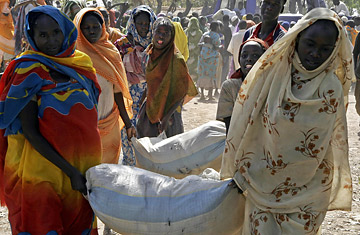
What do we talk about when we talk about global warming? It'll get hotter, that's a safe bet; polar ice caps will be melting, and wildlife that can't adapt to warmer temperatures could be on the way out. But what does it really mean for the health of us, the human race? It's a question that remains surprisingly difficult to answer — research into climate change's impacts on human health have lagged behind other areas of climate science. But what we do know has scientists and doctors increasingly worried — a rising risk of death from heat waves, the spread of tropical diseases like malaria into previously untouched areas, worsened water-borne diseases. "When we think about climate change, we think about ice caps and biodiversity, but we forget about human health," says Dr. Jonathan Patz, a professor of environmental studies and population health sciences at the University of Wisconsin-Madison. "There are a huge number of health outcomes that are climate sensitive."
The World Health Organization (WHO) and other global health bodies are working to remind us of that fact. On March 31 the American Public Health Association (APHA) launched its first blueprint for combating the health impacts of climate change, and on April 7, WHO will dedicate its annual World Health Day to the intersection between disease and global warming. The message is that severe climate change could fundamentally weaken global public health, that doctors need to be ready to deal with the consequences — and that there is a moral case to be made for reducing carbon emissions to save future lives. "If you look at climate change over the long term, it will profoundly affect the pillars of public health: water, sanitation, air quality and sufficient food," says Dr. David Heymann, Assistant Director-General for Health Security and Environment at WHO. "The fact is that human health should be at the center of the political debate on climate change, but right now that's not the case."
The first step to making that case is understanding exactly what warmer temperatures will do to us and our diseases — and few scientists know more about the topic than Patz, a member of the UN's Nobel Prize–winning Intergovernmental Panel on Climate Change (IPCC). (Hear Patz talk about global warming and health on this week's Greencast.) As temperatures increase, and hotter, drier summers become the norm in regions that were once temperate, powerful heat waves — like the one in Europe in 2003, which killed an estimated 35,000 people — will take a toll. At the same time, climate models suggest that rain could become less frequent overall but more intense when it does fall, leading to a double whammy. Longer and fiercer droughts in some areas will worsen hunger, but severe rainstorms carry an increased risk of water-borne diseases like cholera. "It's not just warming, it's climate change," says Patz. "It's changing the air cycle, creating more extreme flooding, more extreme droughts."
For some diseases, climate change will be boon. Take malaria — right now, the insect-borne disease is mostly confined to hot tropical areas, which is why you don't need to take quinine when you're hiking through Central Park. But if temperatures increase, the mosquitoes that carry the malaria parasite will be able to expand their range, while more intense rainstorms will give them more places to breed. A report this year by Australia's Center for Epidemiology and Public Health estimated that between 20 to 80 million more people will be living in malarial regions by 2080, as the parasite expands its range; another study released on April 3 by British doctors raised the possibility that insect-borne diseases — virtually unknown in the cool U.K. — could hit the British isles thanks to climate change. "There's real worry about malaria," says Heymann. "Malaria becomes a more threatening disease as it spreads to new areas where people lack immunity because they haven't had it before."
WHO and other bodies are pushing to strengthen the global public health system in preparation for the changes that global warming might bring. That means readying societies to deal with heat waves — ensuring that the most vulnerable elderly aren't left on their own — and improving defenses against vector-borne diseases, with anti-malaria nets and medicines like artemisinin. Such preparations will be especially needed in those parts of the developing world — sub-Saharan Africa, south Asia — that will bear the brunt of climate change. But Patz would also like to see public health tackle carbon emissions directly, cutting off global warming at the source. For him, carbon dioxide should be treated as a pollutant that damages human health, albeit indirectly, and it's in our medical interests to reduce it. "Energy policy becomes one and the same as public health policy," says Patz.
Policies that cut carbon emissions can have a direct positive impact on human health now as well. Imagine how much better off our environment and our cholesterol levels might be if more of us biked to work rather than drove — or if city planners put greater emphasis on designing more walkable communities and ensuring sustainable public transportation. But the reality is that climate change is happening today, and will be worse tomorrow, even if we manage to pull together a global effort to reduce carbon emissions, which seems less likely and more difficult every day. (A commentary in the April 3 edition of Nature argued that the technological changes needed to decarbonize energy could be much harder than we thought; meanwhile, over in Bangkok, diplomats at the U.N. climate conference last week made little progress on hammering out the successor to Kyoto.) If there is money to be spent on preparing the world for the health impacts of climate change, the priority should be adapting our public health system to a warmer world, versus spending on carbon mitigation. Global warming to some degree will be inevitable — but human suffering needn't be, if we're smart enough to prepare.
